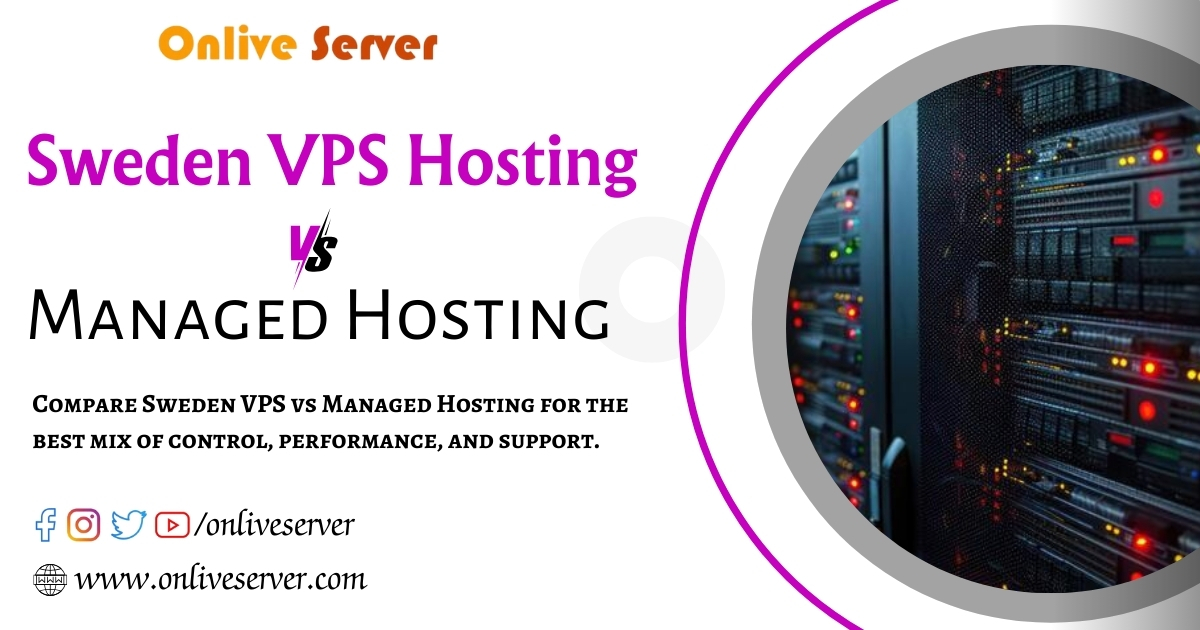
As businesses continue to depend more heavily on comprehensive online infrastructure, choosing the appropriate hosting solution is crucial for optimizing performance, ensuring security, and managing costs. With a plethora of hosting options available, it is vital to grasp the distinctions between popular services like Sweden VPS Hosting and Managed Hosting. This guide explores the dynamic realm of web hosting, emphasizes the strategic significance of server location, and provides an in-depth comparison of Sweden VPS and Managed Hosting. This information will assist you in selecting the perfect hosting approach that is customized to the specific requirements of your business.
The Evolving Landscape of Web Hosting Solutions
Web hosting has evolved significantly from basic shared environments to complex cloud architectures and specialized hosting services. VPS (Virtual Private Server) hosting and managed hosting represent two key solutions catering to different business requirements.
- VPS hosting provides isolated virtual servers on shared physical hardware, combining control, dedicated resources, and affordability.
- Managed hosting delivers fully managed physical or virtual servers, where the provider takes care of setup, maintenance, security, and support.
Choosing between these options depends on factors like technical expertise, budget, scalability needs, and desired control levels.
The Strategic Importance of Server Location
There are specific advantages to hosting your server in Sweden. Known for its robust digital infrastructure, high connectivity speed, and strong data privacy regulations consistent with the GDPR, Sweden offers reliable hosting environment. In addition to ensuring compliance with local data sovereignty laws, hosting locally decreases latency for Swedish and Nordic users, enhances SEO rankings for searches conducted in the region, and improves overall performance. Both Sweden VPS and managed hosting solutions take advantage of these benefits by placing the servers in high-quality data centers located in Stockholm and other Swedish cities, which guarantees high accessibility and performance.
Sweden VPS Hosting: Features and Benefits
Sweden VPS hosting offers a balance between performance, customization, and cost-efficiency. Key features include:
- Dedicated resources such as CPU cores, RAM, and storage allocated exclusively to your VPS instance.
- Full root access enabling installation of custom software, configurations, and control over the server environment.
- Scalability allowing easy upgrades as business demands increase.
- Cost-effective pricing compared to fully managed or dedicated hosting options.
- Geographically localized hosting for improved speed and compliance.
VPS hosting is ideal for developers, startups, and medium-sized enterprises looking for flexibility with moderate technical involvement.
What Makes VPS Hosting Different from Other Solutions?
The VPS model provides dedicated resources unlike shared hosting, so the performance of your server is not influenced by other users. VPS is also cheaper than dedicated hosting, because the overhead of the physical server is shared by multiple VPS clients. VPS provides almost dedicated server functionality with isolated environments and administrative privileges, but the physical hardware is shared among multiple VPS clients which may degrade performance in some extreme load conditions.
Managed Hosting: Comprehensive Service Overview
Managed hosting shifts the responsibility of server management from the client to the provider. This means your hosting provider handles:
- Server provisioning and configuration.
- Security management including patching and firewall setup.
- Performance monitoring and optimization.
- Backup, disaster recovery, and data integrity measures.
- Technical support and troubleshooting.
Managed hosting is often preferred by businesses lacking in-house technical teams or those that prioritize uptime and security without the operational burden of server management.
Technical Architecture: Sweden VPS Hosting vs. Managed Solutions
Sweden VPS hosting often uses KVM or a comparable hypervisor to provision virtual servers on robust hardware, featuring multi-core CPUs, SSDs and abundant RAM. Managed hosting is based on either physical dedicated servers or virtual environments with sophisticated redundancy and backup systems. Providers guarantee high availability through clustered architectures, load balancing, and hardware failover to optimize uptime.
Operating System Availability and Customization
Both Sweden VPS and managed hosting solutions provide extensive support for different operating systems, including several common Linux distributions (like Ubuntu, CentOS, and Debian) and multiple versions of Windows Server. On the other hand, VPS users have full root or administrator access. This means they can install, configure, and customize any software stack and any configuration on their VPS. Managed hosting, depending on the level of management, may impose more restrictions on what operating system can be installed and configured as it may prefer to prioritize stability and security over what users want.
Performance Metrics and Reliability Factors
The performance of VPS hosting is contingent upon the distribution of resources and the load balancing of the server. Fast, reliable performance is delivered by well-configured VPS servers for the vast majority of applications, albeit there may be instances of intermittent resource contention. On the other hand, managed hosting usually provides a higher level of reliability and consistent performance of which SLAs (Service Level Agreements) promise uptime in excess of 99.9%. Providers utilize proactive monitoring and immediate remediation to avert downtime.
Network Infrastructure and Connectivity
Both Sweden VPS and managed hosting employ high-end data centers with several Tier-1 ISP connections for network speed and redundancy. VPS users are allocated a high bandwidth, usually with no cap. Managed hosting customers typically have bandwidth allocated to them that is dedicated and ideal for an enterprise.
Security Framework Comparison
Security is a paramount concern for both hosting types. VPS hosting includes configurable firewalls, secure SSH access, and options for installing security software. However, security management primarily rests with the client.
Managed hosting providers implement comprehensive security protocols including:
- Automated patch management.
- Intrusion detection and prevention systems (IDS/IPS).
- Dedicated hardware firewalls.
- Regular security audits and compliance adherence.
Managed hosting reduces the risk of misconfiguration and vulnerabilities due to expert oversight.
DDoS Protection and Vulnerability Management
Both Sweden VPS and managed hosting include DDoS mitigation strategies; however, the latter provides more advanced, multi-layered protection against an evolving threat landscape. VPS hosting offers a basic level of DDoS protection, after which the onus is on the client to add further layers of protection. By contrast, managed hosting typically includes around-the-clock security monitoring, real-time threat detection, and rapid incident response.
Cost Structure and Return on Investment Analysis
The monthly fees associated with VPS hosting are typically lower, and the service offers a pay-as-you-grow model, which is appealing to startups and SMEs. On the other hand, managed hosting has a larger price tag, but it can actually save money on operations because the provider manages everything for you. The ROI on this service is substantial for companies that prioritize uptime, security, and having a specialist on call.
Long-term Value Proposition of Each Solution
VPS hosting provides flexibility and control that can be advantageous for organizations with appropriate technical capacity. It supports scaling and customization to fit a company’s needs. Managed hosting, on the other hand, provides a level of indirection that allows a business to focus on its core activities while experts manage the infrastructure. Managed hosting is a good fit for organizations whose activities are sensitive to uptime issues.
Administrative Access and Control Panel Differences
VPS clients usually have root or administrative access to their servers, allowing them to have full control over their servers and install any software they want. On the other hand, managed hosting clients have access to user-friendly control panels and leave the configuration of the backend to the provider, which greatly reduces the technical complexity involved.
- Ideal Use Cases for Sweden VPS Hosting
- Development and testing environments.
- Medium-traffic websites and blogs.
- SaaS startups needing flexible infrastructure.
- Businesses with in-house technical teams.
- When Managed Hosting Becomes the Optimal Choice
- Enterprises requiring guaranteed uptime and high availability.
- Organizations without dedicated IT staff.
- Businesses with stringent security and compliance needs.
- Companies preferring a hands-off approach to server management.
Conclusion
The decision to opt for Sweden VPS Hosting or Managed Hosting depends on your business objectives, technical know-how, financial resources, and preferred extent of autonomy. Cheap VPS Server Hosting is an affordable and adaptable solution with exclusive resources that is advantageous for technically proficient teams willing to handle server administration. Conversely, managed hosting delivers an entirely taken care of environment emphasizing dependability, safety and ease of operation, and is most suitable for organizations or businesses that concentrate on core competencies without having to deal with IT infrastructure. By comparing your needs with these parameters, you can choose a hosting strategy that enhances your online performance and business development in the competitive landscape of Sweden and the world.
